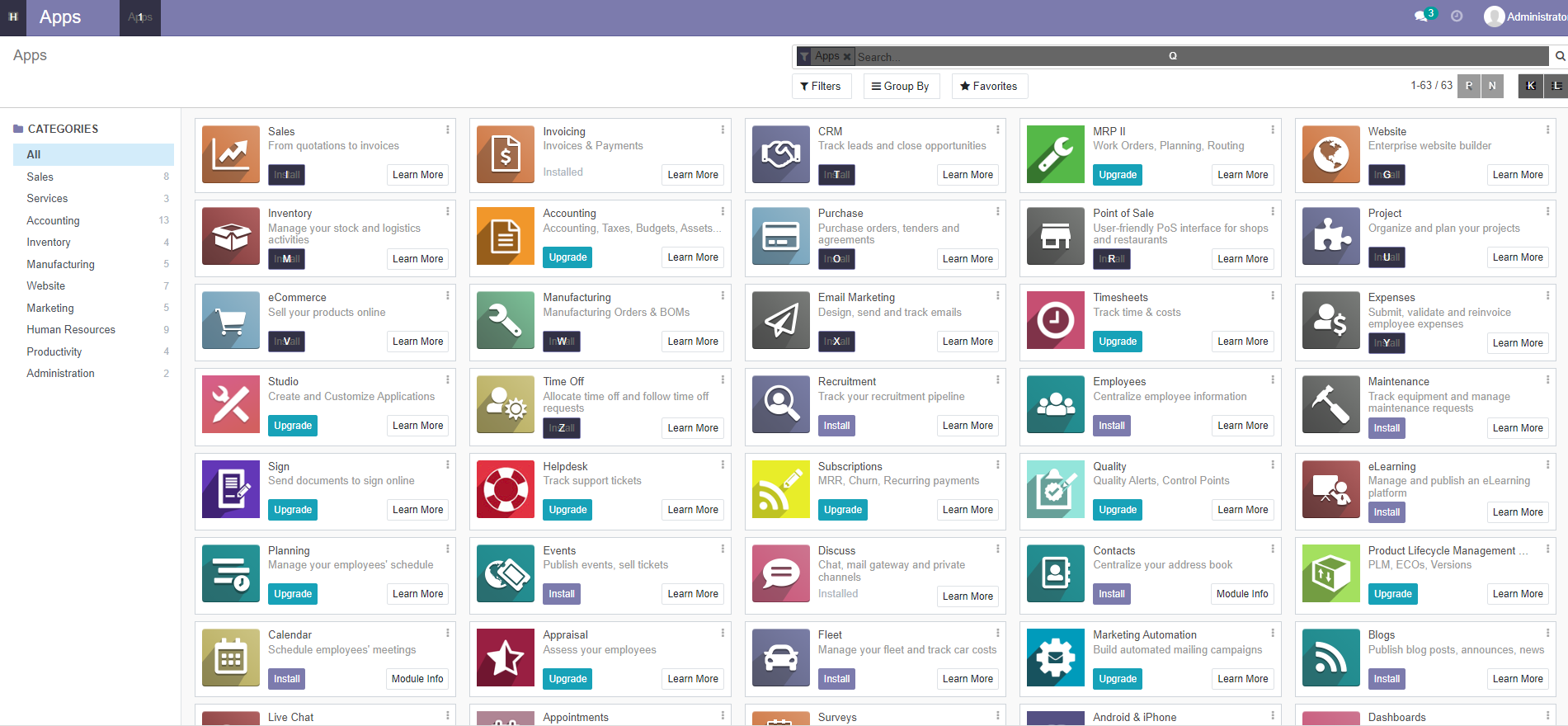
Cloud ERP Hosting Solutions, Open-Source ERP Software as a Service
Cloud ERP hosting is always online, and security updates are handled by
cloud ERP providers. Your team only needs to worry about logging in and
using ERP and its underlying data. Compared with on-premise ERP, cloud
ERP will reduce costs.
Cloud ERP Solution Recommendations
Owncloud cloud platform offers a variety of cloud ERP solutions at quite low prices. Find your favorite ERP software here
Reasons to Migrate to Owncloud ERP Hosting Platform
We host and manage software on our own servers and provide continuous IT support.

ERP Implementation
One of the biggest obstacles to any new ERP solution is the implementation time. Enterprises can usually start and run ERP system faster on the cloud than locally as running cloud-based ERP does not need to select and set up hardware or hire and train their personnel.

Scalability
Without the challenge of adding more servers for more users, locations, or subsidiaries, cloud-based ERP solutions can easily expand spaces as the business grows.

Security, Disaster Recovery
As a Cloud-based ERP provider, we provide better security and compliance than other companies. Enterprises can rest assured that their data is always backed up, and suppliers have planned and practical disaster recovery procedures.

Accessibility
Cloud-based ERP users can access business information in real-time on any device anytime, anywhere. This ensures that employees across the organization use the same data, regardless of business unit or location

Cost Reduction
The cost of cloud ERP is usually about 30% lower than that of local ERP. We host and manage software on our own servers, so enterprises can avoid the expense of early infrastructure and the additional cost of IT personnel, maintenance, security, and update.

Customization and Agility
Cloud-based ERP not only can be expanded with organizations but can also be easily customized to meet business needs. The cloud ERP system tends to be well integrated with other cloud-based products. The agility enables enterprises to actively rather than passively adapt to industry changes, consumer trends, and unforeseen situations.

Upgrade
Owncloud continuously manages all system upgrades and updates to keep up with changing business needs and ensures that customers use the latest technologies. With our cloud ERP, the update takes only 30 minutes to apply and usually happens during off-duty hours for the least business interruption.

Storage Resilience and Access
With our cloud-based ERP, data is stored in our data center, which is usually redundant and geographically dispersed. This is also conducive to accessing business information and data through the Internet.
Frequently Asked Questions of Cloud ERP
ERP hosting is a web-based software solution and a third-party service
that can help enterprises move their ERP software to the cloud.
Cloud ERP is enterprise resource planning software that is accessible
over the Internet. As the IT backbone or “brains” of a company, cloud
ERP software provides advanced functionality for all the core processes
in an organization.
Hosted on a provider’s cloud computing
platform, cloud ERP is typically delivered “as a service”
(software-as-a-service or SaaS ERP). Customers don’t own the software
but instead lease it on an annual or monthly subscription basis. There
are no upfront hardware costs – and the vendor takes care of application
maintenance, upgrades and innovations, data storage, and security.
Open-source ERP software includes all functional modules required by
conventional ERP software. These modules include invoices, inventory
management, sales management through an e-commerce platform, human
resources, and project management.
Cloud ERP systems work with a combination of technologies connected by
high-speed internet networks. The cloud ERP is always online and
security updates are handled by the ERP provider. All your team only has
to worry about logging in and using the ERP and its underlying data.
This may lead to a lower cost of ownership than older ERP systems hosted
on company-owned servers.
In many cases, cloud ERPs are
accessible to users on mobile devices or desktop computers. They include
a wide range of business applications to keep your business running
efficiently with a focus on a positive customer experience and
profitable business outcomes.
Cloud-based ERPs offer high
scalability and empower your team to access any information they need
wherever their work takes them, from customer sales meetings to remote
worksites to your home office.
If a solution is advertised as open source, it is 100% free. Depending
on the size and scale of your company, self-managed software installed
locally or deployed on-premises may be your correct choice. This means
that you have full access to the software for free. However, if cloud
(SaaS) suits you, you will need to spend about $40/m on VPS, pay extra
for security and backup, and spend time setting up all the content.
CloudClusters cloud platform will provide cloud services at the cheapest
price, starting from 4.99/m. Try it for free.
On-premise ERP solutions are installed locally on your company's
hardware and servers and then managed by your IT staff, while cloud
ERP—also called SaaS or Software-as-a-Service—is provided as a service.
Security has become the number one priority for SaaS ERP publishers, and
as a direct result, the security market is doing well: + 8% growth for
cyber security in 2018, according to Gartner. Publishers are well aware
of the risks of storing data in the Cloud and do not skimp on
investments.
There are endless benefits to utilizing SaaS to implement your ERP
system, including cost, scalability, innovation, and efficiency. As
technology continues to improve and infrastructure costs rise, more
companies will adopt SaaS to deliver their ERP applications.
In terms of ERP application development, both Odoo and ERPNext provide
promising solutions for business problems in specific industries.
However, Odoo is more powerful and provides several unique functions,
making it one of the best platforms for customized ERP development. On
the other hand, ERPNext is more suitable for building simple and
lightweight business applications with basic features and functions.
Yes. For each account, we support deploying up to 3 concurrent trial
applications, and each application can be used for 7 days for free.
Yes. We offer a 99.9% uptime guarantee for our network and all servers.
The deployment of these cloud ERP applications on our platform can be a matter of minutes, even seconds.


